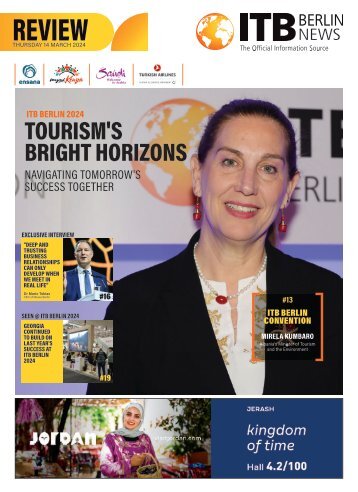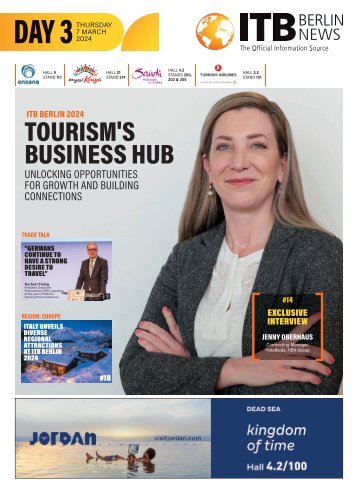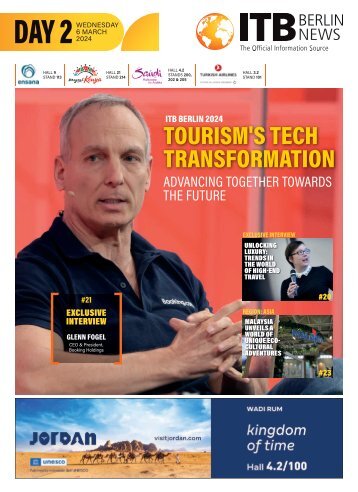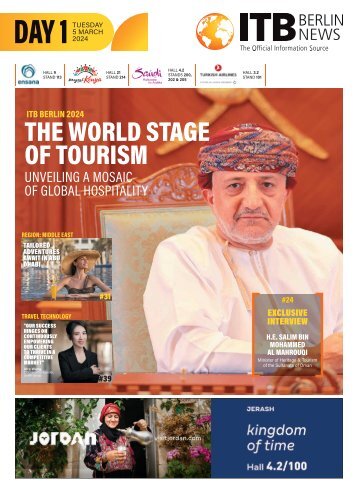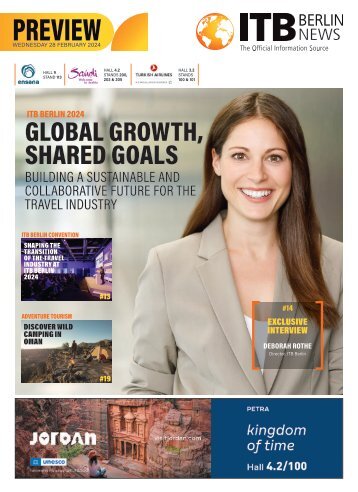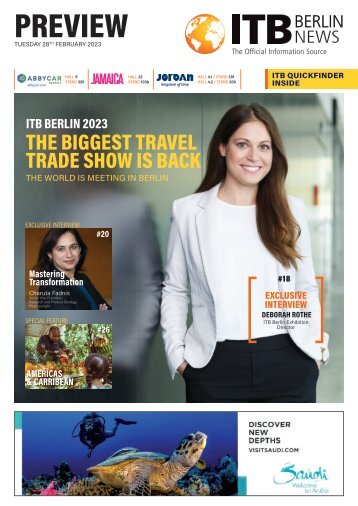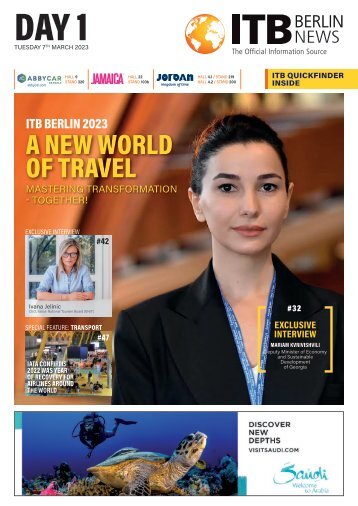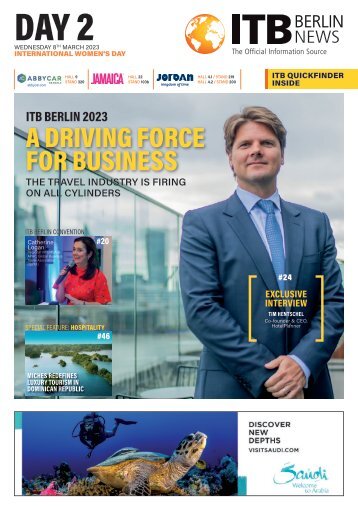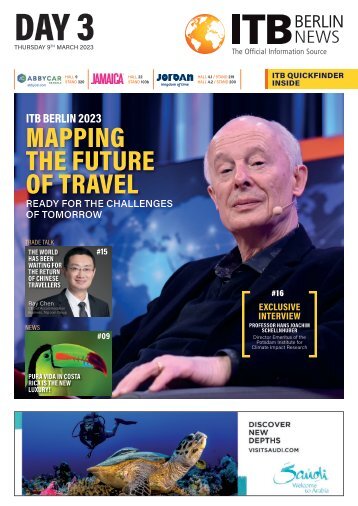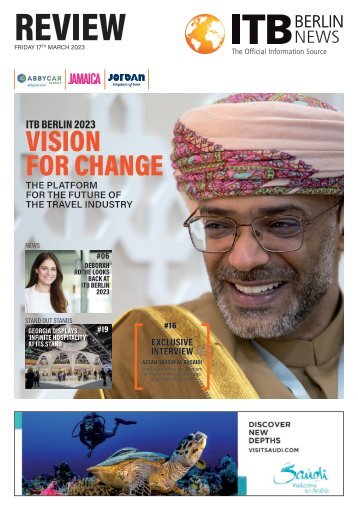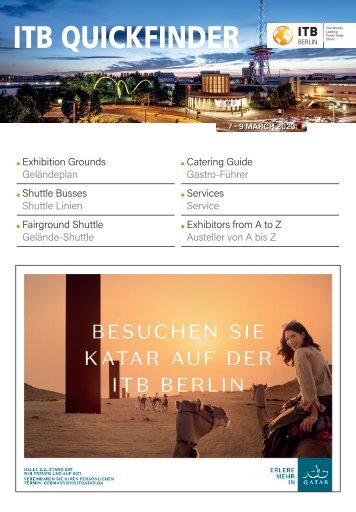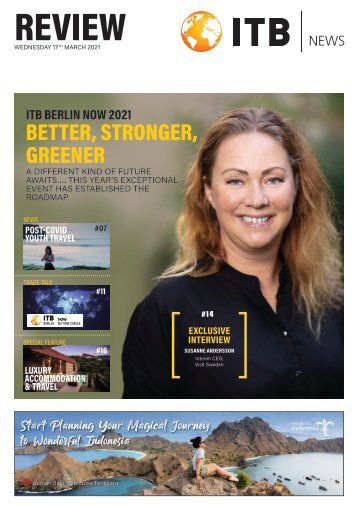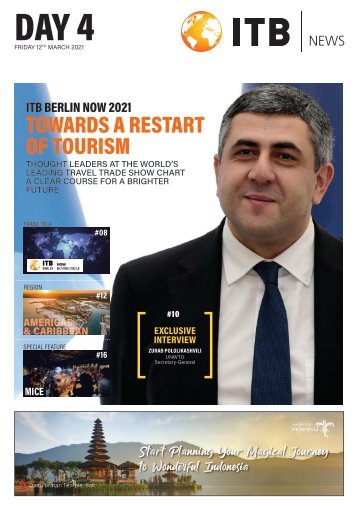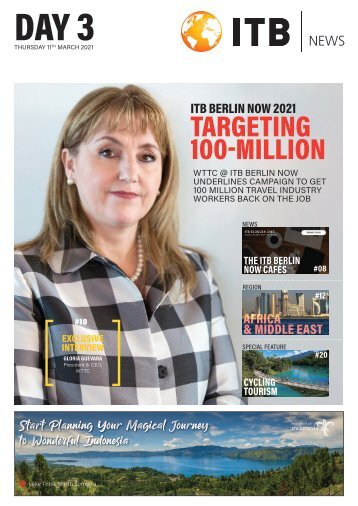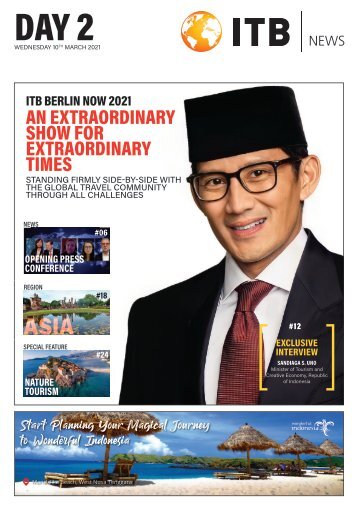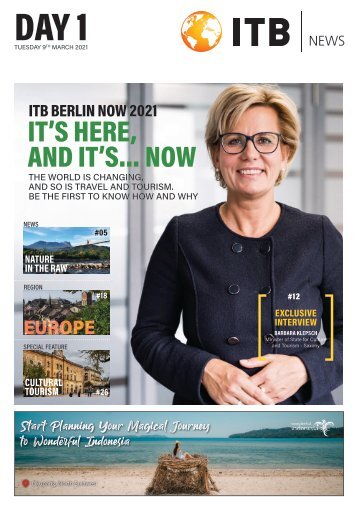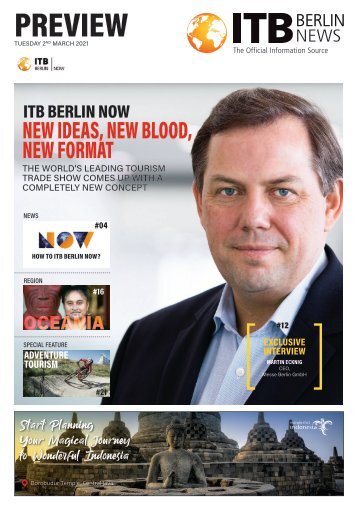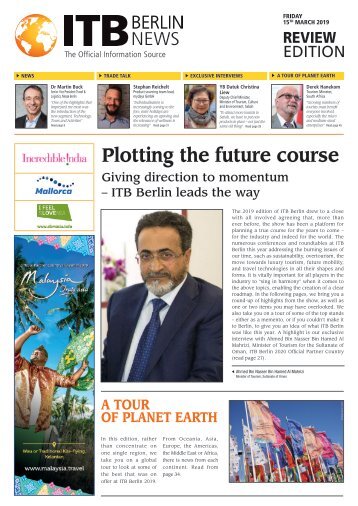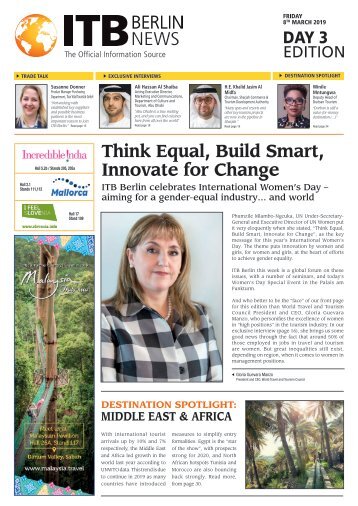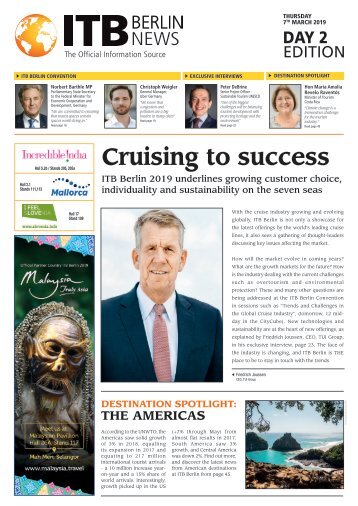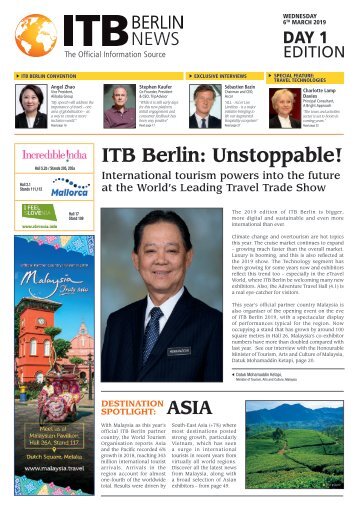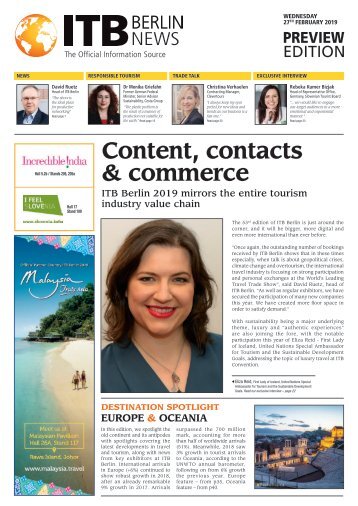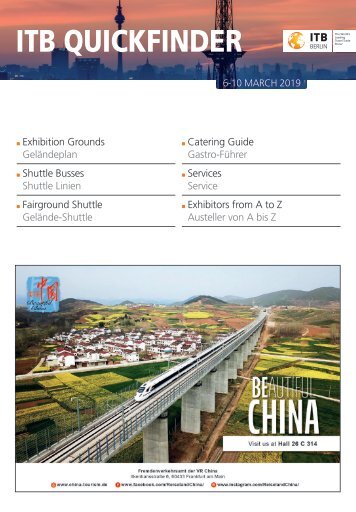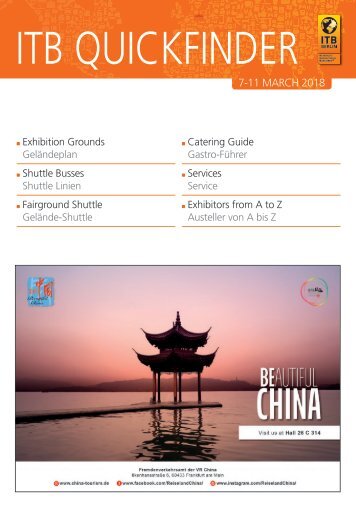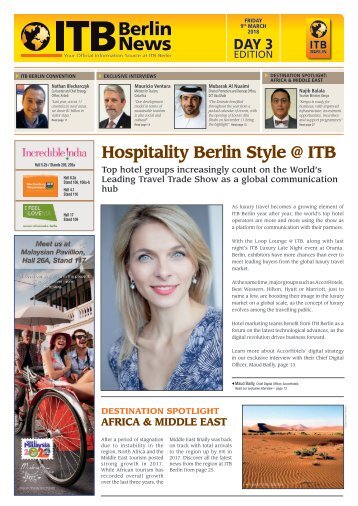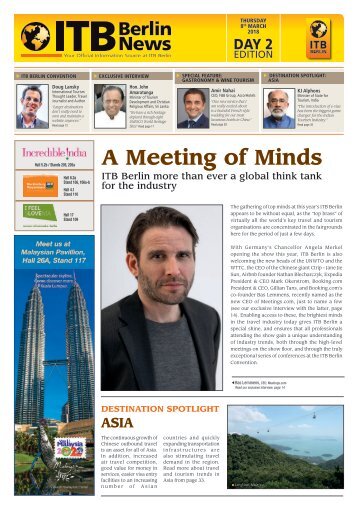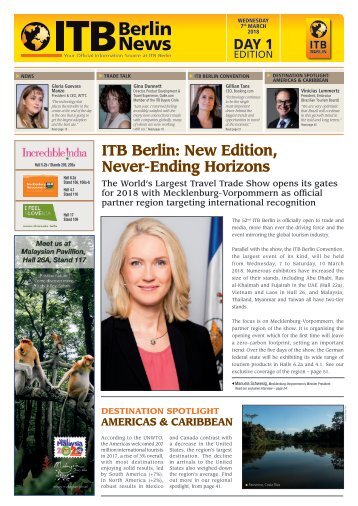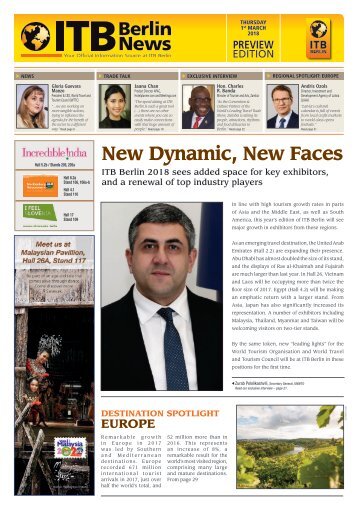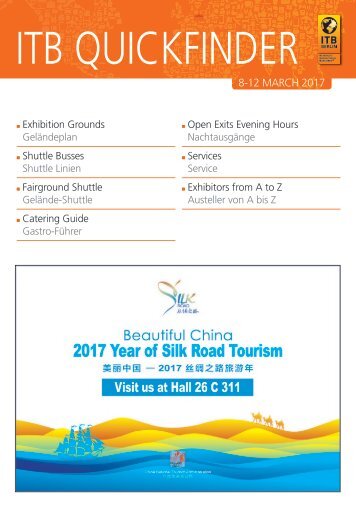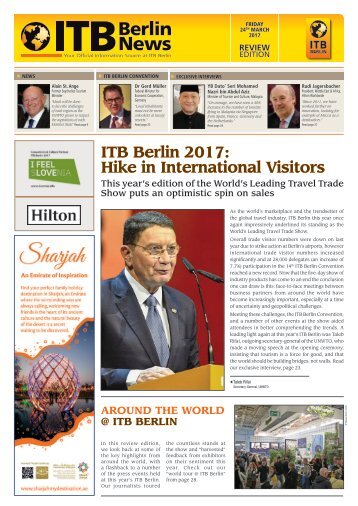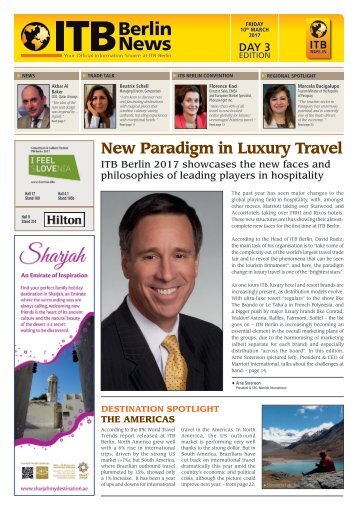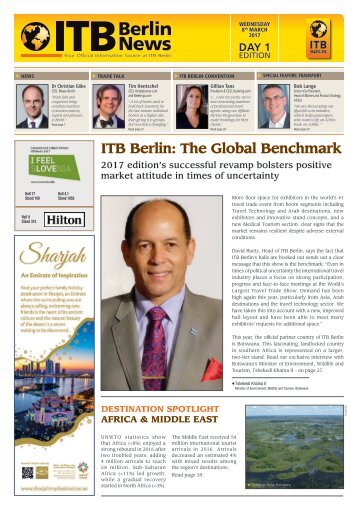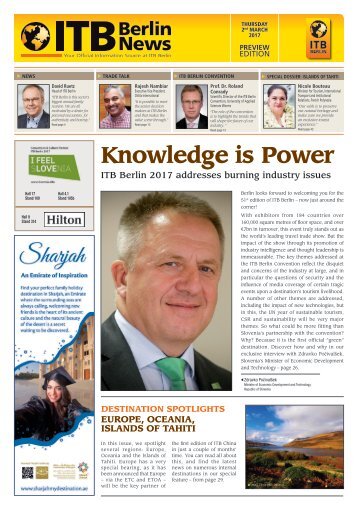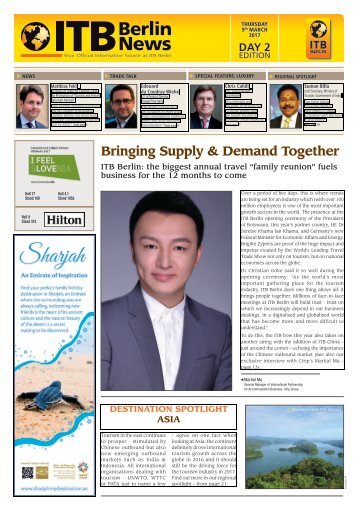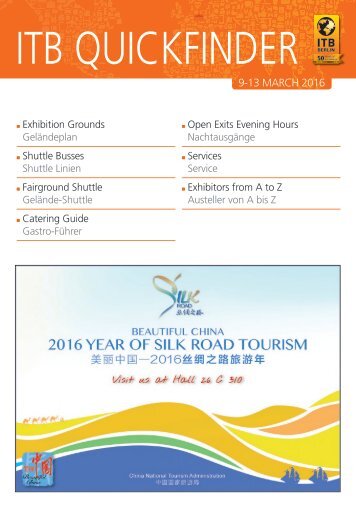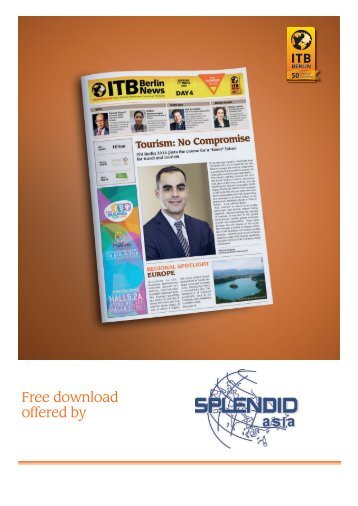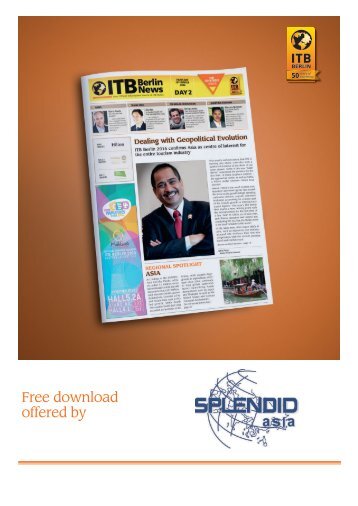
ITB Berlin News 2018 - Day 2 Edition
- Text
- Tourism
- Berlin
- Destination
- Region
- Destinations
- Buyers
- Travellers
- Arrivals
- Gastronomy
- Luxury
- Www.cleverdis.com
12 ITB
12 ITB BERLIN CONVENTION Doug Lansky International Tourism Thought Leader, Travel Journalist and Author Dr László Puczkó Director of Industry Intelligence, Resources for Leisure Assets RETHINKING THE DMO Category: Future, Marketing Date: March 8, 2018 Time: 5pm – 5.45pm Location: Convention Hall 7.1b, Auditorium London FREE FROM... BUSINESS BOOST OR COMPETITOR? Category: Destinations, Wellness Date: March 8, 2018 Time: 12.25pm – 12.45pm Location: Convention Hall 7.1a, Auditorium New York 3 The Changing Role of the DMO “Free from” Phenomenon to Become Travel Standard? At this year’s ITB Berlin Convention, Doug Lansky, International Tourism Thought Leader, Travel Journalist and Author, takes a closer look at the changing role of the DMO (and NTO and CVB) and explores what the future holds. We asked him to tell us more about recent changes. With more and more people recognising they suffer from food allergens and intolerances, operators really need to know all about the latest buzzword, ‘free from’. We asked Dr László Puczkó, Director of Industry Intelligence, Resources for Leisure Assets, to tell us more. The DMO has undergone a lot of change already. We’ve seen DMOs jump into search engine optimisation, social media, and data analytics. There are some things that they are currently doing that I believe are outdated and other new areas they would do well to enter. What don’t they need to do any more? I don’t think they need to spend time and money on Tourist Information offices. Just to be clear, I’m not saying these info offices are bad, but there are many more cost-effective replacements, from staff on bicycles or Segways deployed in tourist areas to offsite call centres. The fact is, with smartphone and helpful hotel desks, typically less than 2% of people visiting a city even enter the tourist office, and about half of those are only there for the toilet. How do you believe larger destinations need to change? Larger destinations don’t really need to own and maintain a website anymore. A city like London, New York, or Rome has thousands of blogs and hundreds of reliable, independent guidebook websites with dedicated pages and good, updated information, from Lonely Planet to The Guardian to TimeOut. What areas should DMOs be focusing on? A Smart Tourism Strategy is about maximising profit while maintaining a high-quality experience. This new DMO structure would cover everything from clean beaches to businessclass public toilets to over tourism to increasing the average visitor spend. What about the leakages that are not being factored into the tourism business model? Everything that doesn’t end up in the destination (or increases costs) needs to be counted. If we start looking at yield, destinations can start making smarter decisions More and more people want to know what’s in their food, where it comes from and the details about how it’s made. The freefrom demand does not stop at foods and drinks, though. Now literally every spectrum of our lives is affected by that – the bed we sleep in; the clothes we wear; the creams, lotions and other products we use on our body, etc. What does the free-from phenomenon have to do with wellness? We have to consider market intelligence from general consumer profiles, from hospitality and wellness developments to conclude how the wellness tourism sector can and should respond. Wellness hotels and centres all around the world show signs of conversion in terms of what and how they offer to their guests. It is not a novel idea to suggest that what we currently see in hotels will soon become the entry level standard and not a USP. Wellness operators therefore need to think outside the box. One rather relevant option is to turn to natural resources such as thermal springs, muds, microclimate or cultural traditions, lifestyles and rituals. What advice do you have for operators and developers? ‘Free from’ guests can be attracted by services and treatments that have natural properties and represent cultural value. Evidence is the key and that can turn such novel approaches such as ‘prancercising’ (yoga+crossfit+Japanese horseback archery) to something more mainstream. Old terminologies and concepts enjoy revival. Heritage is no longer a dusty old term. Contemporary is no longer the opposite of traditional (consider contemporary traditional lifestyle as an option). Operators and developers need to look for new skill sets and funding strategies since, as, for example, a thermal resource based hotel needs to be run significantly differently to a standard ‘wellness hotel’ ITB BERLIN NEWS • Thursday 8 th March 2018 www.itb-berlin-news.com
ITB BERLIN CONVENTION 13 Andriew Lim Professor of Technopreneurship and Innovation at Hotelschool Florian Storp Vice President Central Europe, American Express Global Business Travel BLOCKCHAIN: OPPORTUNITIES OR CHALLENGES FOR HOSPITALITY? Category: eTravel World Date: March 8, 2018 Time: 2.30pm – 3pm Location: Hall 7.1c, eTravel Lab BUSINESS TRAVEL COMPLETELY DIGITAL! Category: CSR, Business Travel, MICE Date: March 8, 2018 Time: 3pm – 3.45pm Location: Convention Hall 7.1a, Auditorium New York 2 Blockchain: A Game of Two Halves Digitalisation is Becoming the Business Travel Norm As Professor of Technopreneurship and Innovation at Hotelschool in The Hague, one of Andriew Lim’s roles is to see how emerging technology might influence the business landscape of the hospitality industry. We asked Mr Lim for his thoughts on Blockchain. Blockchain, is an emerging technology that can be disruptive, not only for hospitality industry, but for many industries. Blockchain has been adapted for online electronic transactions. At the ITB Berlin Convention, my session will present various initiatives in which hospitality companies have used blockchain. Blockchain itself, in general, can be described as a distributed ledger system based on the value record that supports transactions in a decentralised and autonomous way. It is the backbone of cryptocurrencies, that has made transactions of cryptocurrencies possible. Do you have any case examples? Currently there are various companies having the initiative to develop and assess how blockchain can be implemented in their business. An example in the hospitality industry is shown by Lockchain, a company that has developed an open source distributed ledger, which will list all available accommodations and their prices including previous transactions done on blockchain. Since this would enable secure data transactions, blockchain might have great potentials in the future, as well as challenges. What challenges do you foresee? One of the challenges could be the economy of scale, just like the telephone network and internet in their infancy period, the cost of transactions is still high. But perhaps over a few years, blockchain might be adopted for other applications in the hospitality industry. How important is the ITB Berlin Convention when it comes to educating and informing the industry on emerging trends? The ITB Berlin Convention is an important international stage to keep all stakeholders in the hospitality and travel industries updated with recent trends, as it is the biggest event in the world the sector. There are many new updates that can be gained from ITB Berlin and the ITB Berlin Convention At this year’s ITB Berlin Convention, Florian Storp, Vice President Central Europe, American Express Global Business Travel (GBT), will exploring the effects of digitalisation on travel management − together with American Express GBT customer Nils Neuenhüsges, who is Head of Sourcing of Indirect Materials at Jungheinrich AG. We asked him to tell us more… At the core of this message is: look at what the young people are doing now, and you can see how digitalisation needs to perform on a business trip − completely mobile and connected employees expect a level of flexibility that goes far beyond travel policies and company car hierarchies. In the forum we’ll show with practical examples how TMCs and customers can meet these challenges together. How is digitalisation impacting within your business, and the wider travel market? It’s not an exaggeration to say that today’s travel management is digital travel management. Booking has been digital since the 1970s, but since the introduction of smartphones and mobile apps, digitalisation has reached the travellers. Travel documents, itineraries, room keys all have become electronic, and nowadays travellers are empowered to do their own rebooking and rescheduling while on the road – I regularly see this happening in those few minutes between the landing of a plane and the doors opening. How important is Artificial Intelligence in the business travel market? Artificial intelligence is very much on its way into the heart of the business travel industry. Chatbots, such as already being used by airlines’ customer service centres, are just a start. In future we will see Alexa-like intelligences organising complete business trips automatically, fully compliant to travel policies and guidelines, and taking into account traveller preferences − as soon as an appointment is fixed in the electronic calendar. This opens up tremendous opportunities of efficiency, compliance and cost-savings. American Express GBT is actively working on solutions ITB BERLIN NEWS • Thursday 8 th March 2018
- Page 1: THURSDAY 8 th MARCH 2018 DAY 2 EDIT
- Page 7 and 8: NEWS 7 © TMV/Danny Gohlke Tourists
- Page 10 and 11: 10 NEWS ADVERTORIAL Majda Rozina Do
- Page 14 and 15: 14 EXCLUSIVE INTERVIEW THE BIGGEST
- Page 16 and 17: 16 EXCLUSIVE INTERVIEW ADVERTORIAL
- Page 19 and 20: SPECIAL FEATURE CRUISES 19 Cruise B
- Page 21 and 22: ADVERTORIAL SPECIAL FEATURE CRUISES
- Page 23: SPECIAL FEATURE LUXURY ACCOMODATION
- Page 27: SPECIAL FEATURE GASTRONOMY & WINE T
- Page 30 and 31: 30 SPECIAL FEATURE GASTRONOMY & WIN
- Page 33 and 34: Brought to you by ASIA REGION 33 Ch
- Page 35: Brought to you by ASIA REGION 35 In
- Page 38 and 39: 38 REGION ASIA Brought to you by IT
- Page 41: Brought to you by ASIA REGION 41 Th
- Page 45 and 46: Brought to you by ASIA REGION 45 Ja
- Page 47: Brought to you by ASIA REGION 47 AD
- Page 50 and 51: 50 REGION ADVERTORIAL ASIA Brought
- Page 52 and 53: 52 SPOTLIGHT ON GERMAN REGION: BAVA
- Page 54: 54 Hospitality Chaussee36 - Bedroom
Inappropriate
Loading...
Mail this publication
Loading...
Embed
Loading...
